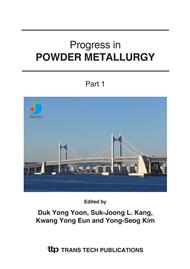p.1141
p.1145
p.1149
p.1153
p.1157
p.1161
p.1165
p.1169
p.1173
Development of High Corrosion Resistant Mo2NiB2 Boride Base Cermets for Plastic Injection Molding Machine Parts
Abstract:
Injection molding of corrosive super engineering plastics and engineering plastics with various fillers is conducted under severe conditions and causes corrosion and wear problems. Hence, in orde to apply Mo2NiB2 boride base cermets into plastic molding machine parts, the effects of V substitution for Cr on the mechanical properties, corrosion resistance and microstructure of Ni- 5.0B-51.0Mo-(17.5-X)Cr-XV (mass%) model cermets were investigatied. Both transverse rupture strength (TRS) and hardness increased monotonically with increasing V content and reached 2.94GPa and 87.2RA at 10.0%V, respectively. The improvements of TRS and hardness were attributed to microstructural refinement. The excellent corrosion resistance for a molten fluorocarbon resin was obtained up to 5.0%V.
Info:
Periodical:
Pages:
1157-1160
Citation:
Online since:
January 2007
Authors:
Price:
Сopyright:
© 2007 Trans Tech Publications Ltd. All Rights Reserved
Share:
Citation:


